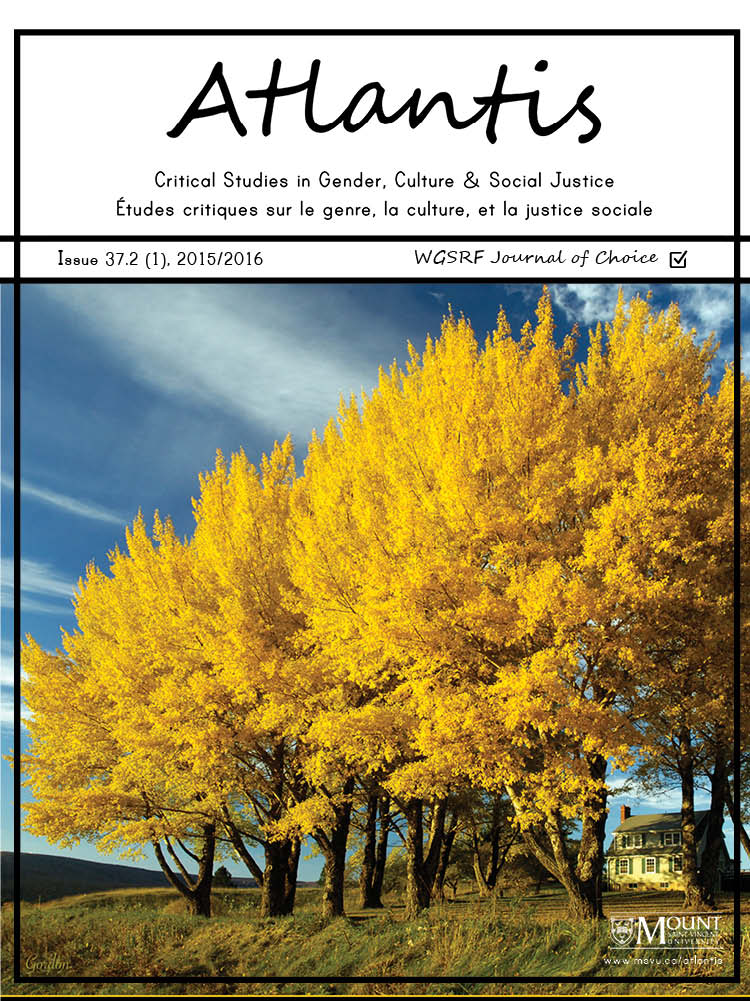Critical Perspectives on Canadian Anti-Trafficking Discourse and Policy
Abstract
Cluster EditorialMetrics
References
Agustín, Laura. 2003. “Sex, Gender and Migrations: Facing up to Ambiguous Realities.” Soundings 23: 84-98.
Agustín, Laura. 2007. Sex at the Margins: Migration, Labour Markets and the Rescue Industry. London, U.K.: Zed Books.
Anderson, Bridget, and Rutvica Andrijasevic. 2008. “Sex Slaves and Citizens: The Politics of Anti-Trafficking.” Soundings 40: 135-145.
Bernstein, Elizabeth. 2007. “The Sexual Politics of the ‘New Abolitionism’.” differences 18 (5): 128-151.
De Shalit, Ann, Robert Heynen, and Emily van der Meulen. 2014. “Human Trafficking and Media Myths: Federal Funding, Communication Strategies, and Canadian Anti-Trafficking Programs.” Canadian Journal of Communication 39: 385-412.
Doezema, Jo. 2001. “Ouch!: Western Feminists’ ‘Wounded Attachment’ to the ‘Third World Prostitute’.” Feminist Review 67: 16-38.
Doezema, Jo. 2010. Sex Slaves and Discourse Masters: The Construction of Trafficking. London, UK: Zed Books.
Global Alliance Against Traffic in Women (GAATW). 2011. What’s the Cost of a Rumour? A Guide to Sorting Out the Myths and the Facts About Sporting Events and Trafficking. Vancouver, BC: Global Alliance Against Traffic in Women. http://www.gaatw.org/publications/WhatstheCostofaRumour.11.15.2011.pdf
Hunt, Sarah. 2013. “Decolonizing Sex Work: Developing an Intersectional Indigenous Approach.” In Selling Sex: Experience, Advocacy, and Research on Sex Work in Canada, edited by Emily van der Meulen, Elya M. Durisin, and Victoria Love, 82-100. Vancouver, BC: University of British Columbia Press.
Kempadoo, Kamala, with Jyoti Sanghera and Bandana Pattanaik, eds. 2005. Trafficking and Prostitution Reconsidered: New Perspectives on Migration, Sex Work, and Human Rights. Boulder, CO: Paradigm Publishers.
Lepp, Annalee. 2013. “Repeat Performance? Human Trafficking and the 2010 Vancouver Olympic and Paralympic Games.” In Selling Sex: Experience, Advocacy, and Research on Sex Work in Canada, edited by Emily van der Meulen, Elya M. Durisin, and Victoria Love, 251–268. Vancouver, BC: University of British Columbia Press.
Peters, Alicia. 2013. “‘Things that Involve Sex are Just Different’: US Anti-Trafficking Law and Policy on the Books, in Their Minds, and in Action.” Anthropological Quarterly 86 (1): 221-256.
Public Safety Canada. 2012. National Action Plan to Combat Human Trafficking – 2012-2013 Annual Report on Progress. Ottawa, ON: Public Safety Canada. http://www.publicsafety.gc.ca/cnt/rsrcs/pblctns/2013-ntnl-ctn-pln-cmbt-hmn/2013-ntnl-ctn-pln-cmbt-hmn-eng.pdf.
Roots, Katrin. 2013. “Trafficking or Pimping? An Analysis of Canada’s Human Trafficking Legislation and its Implications.” Canadian Journal of Law and Society 28 (1): 21-41.
Sharma, Nandita. 2005. “Anti-Trafficking Rhetoric and the Making of a Global Apartheid.” NWSA Journal 17 (3): 88-111.
Small, Deborah, George Loewenstein, and Paul Slovic. 2007. “Sympathy and Callousness: The Impact of Deliberative Thought on Donations to Identifiable and Statistical Victims.” Organizational Behavior and Human Decision Processes 102: 143–153.
Soderlund, Gretchen. 2005. “Running from the Rescuers: New U.S. Crusades against Sex Trafficking and the Rhetoric of Abolition.” NWSA Journal 17 (3): 64-87.
Stanley, Brandy. 2009. “Sensationalism and its Detrimental Effect on the Anti-Human Trafficking Movement: A Call to a Critical Examination of ‘Abolitionist’ Rhetoric.” A partial completion of Contemporary Slavery and Human Trafficking. Josef Korbel School of International Studies. University of Denver.
Weitzer, Ronald. 2012. “Sex Trafficking and the Sex Industry: The Need for Evidence-Based Theory and Legislation.” The Journal of Criminal Law and Criminology 101 (4): 1337-1369.
Downloads
Published
Issue
Section
License
Authors who publish with this journal agree to the following terms:
1. Authors retain copyright and grant the journal right of first publication, with the work simultaneously licensed under a Creative Commons Attribution 4.0 International License that allows others to share the work with an acknowledgement of the work's authorship and initial publication in this journal.
2. Authors are aware that articles published in Atlantis are indexed and made available through various scholarly and professional search tools, including but not limited to Erudit.
3. Authors are able to enter into separate, additional contractual arrangements for the non-exclusive distribution of the journal's published version of the work (e.g., post it to an institutional repository or publish it in a book), with an acknowledgement of its initial publication in this journal.
4. Authors are permitted and encouraged to preprint their work, that is, post their work online (e.g., in institutional repositories or on their website) prior to and during the submission process. This can lead to productive exchanges, as well as earlier and greater citation of published work. Read more on preprints here.






